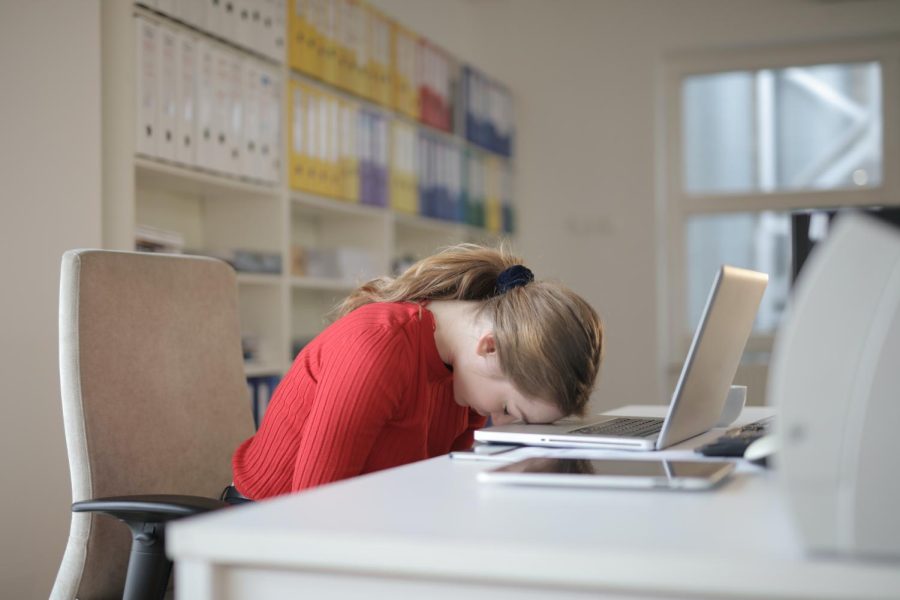Read This if You’re Feeling Tired
Students aren’t sleeping, and it’s having an impact.
You’re sleep-deprived. Well, you probably are, according to the Journal of Adolescent Health. In a study of over 1,000 university students ages 17 to 25, researchers categorized over 60 percent as “poor quality sleepers.” When students’ schedules are packed with exams, extracurriculars, and attempts at a social life, something usually has to give—looking at this study, that “something” is sleep.
So, Why Are We Tired?
A variety of factors in a student’s day-to-day life can affect sleep quality. For instance, many college students hold part-time jobs, which the Center for Disease Control (CDC) identifies as a primary source of sleep-related issues in the college demographic.
The CDC reports, “We found that employment was significantly associated with sleep problems among college students […] Students, most of whom held part-time jobs and thus had less job control yet high job demands, might understandably experience substantial sleep difficulties and reduced sleep quality in general.”
“Also, the competing demands to complete academic requirements and maintain employment may also serve as structural barriers to adequate sleep.”
Work experience may help build a resume. It may offer a steady source of income. The problem is that students still have to complete their schoolwork while also meeting the demands of their employer. When students are working an average of 28.3 hours a week, well above the recommended 10 to 20 hours, time starts to run short.
The Okra Sleeps Tonight?
Academic demand alone is already enough to affect one’s sleep. Medical News Today reports that 20 percent of college students will pull at least one “all-nighter” per month, with 35 percent staying up until 3 a.m. about one night every week. Moreover, “stress about school and life” keeps 68 percent of students awake at night.
According to junior Lauren Harvey, Delta State students are no exception. “I don’t think that college students get enough sleep,” she says. “Part of [my lack of sleep] is just being a college student who has a nearly full-time job, plus I’m a full-time student. I don’t have another option but to do my homework at night.”
Your real only option is to do homework when you’re supposed to be sleeping…
— Lauren Harvey
Harvey contintues, “So I think that there are a lot of working-class students that are similar to that. Not to mention if they’re in extracurriculars like sports or sororities or fraternities. So your real only option is to do homework when you’re supposed to be sleeping. And then, you know, next morning comes and you have to be at work at 8 a.m. Same cycle over and over and over again.”
Other factors influencing students’ sleep-related issues, per Newsport Institute, include “video games, social media, texting, and watching tv.” Even seemingly inconsequential habits can contribute to the “cycle” of sleep reduction, as Harvey puts it.
Okay, I’m Not Sleeping, So What?
Reduced sleep can be a serious detriment to one’s academic performance and overall mental health. In an article for the Sleep Foundation, science writer Eric Suni lists several symptoms of sleep deprivation, including “slowed thinking, reduced attention span, worsened memory, poor or risky decision-making, lack of energy, [and] mood changes.”
Impaired thinking naturally has an impact on academic performance. Research demonstrates a direct correlation between one’s sleeping habits and GPA. The journal “Natural Science of Sleep” describes a study in 2000 on students’ sleep patterns: “Among first-year university students, sleep patterns also influenced GPA; each hour delay in weekday or weekend rise time decreased the GPA by 0.132/4.0 and 0.115/4.0, respectively.”
The same article reports a study that compared students just after an all-nighter to those with a full eight hours of sleep. Students who stayed up all night vastly overestimated their performance on a given cognitive test. In reality, they performed noticeably worse than their well-rested counterparts.
More generally, sleep reduction poses a significant risk to one’s mental health; even minor shifts in sleeping habits have an impact. In “Sleep Habits and Patterns of College Students: A Preliminary Study,” researchers Walter C. Buboltz, Jr., Franklin Brown, and Barlow Soper observe, “Interestingly, even students who sleep 8 hours nightly but shift their sleep-wake cycle by 2 hours experience increased feelings of depression, reduced affability, and difficulty in concentrating.”
Those who sleep later on weekends than on weekdays, the authors state, “experience increased irritability and depression.”
Basically. . .
Students aren’t sleeping, and it’s having an impact. Pulled between life’s various demands, they may find themselves pulling an all-nighter for school only for their lack of sleep to worsen the quality of their work. If they’re staying out late for extracurriculars or social events, their mental health could negatively influence their enjoyment. In their attempts to skip out on sleep for more time, college students overlook the detriment this can cause to the time they already have.

Kelly Foster has lived in Flowood, Miss., ever since her family moved there from Brandon, Miss., when she was 15 years old. She enjoys going to restaurants,...



